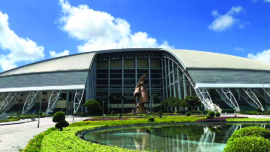Business Daily: The 62nd edition of the Macau Grand Prix is about to start. What are the new attractions that people can expect?
João Costa Antunes: This year, we have our work recognised again by the FIA (International Automobile Federation) as eight years after introducing GT races to the Macau Grand Prix we were approached by FIA to host the World Cup. This is the main difference in relation to the previous edition. In relation to touring cars, were hosting the last round of the new TCR International series, which is a championship we believe has a very bright future ahead. On top of this, we will continue to host the FIA Formula 3 International Cup and receive the best road motorcycle riders. The schedule of the Grand Prix is very complete and has a lot to offer and in my view this is this best edition ever organised.
How many manufacturers will be involved directly in this years edition regarding the FIA GT World Cup?
Five manufacturers will officially be involved in this years edition of the race. Considering these events required a lot of planning for the manufacturers and that the conversations with the FIA started in a period that was so early this is a good number. There are other car brands involved through non-official teams. The signs we have are that next year there will be more and more manufacturers racing officially in this competition.
Usually the racing programme of the Grand Prix is not decided before March of the same year of the races. However, youre already expecting the FIA GT World Cup to have more manufacturers racing in 2016. Is this a confirmation that this race will be in next years programme?
One of our guiding principles is that the programme of the Macau Grand Prix is defined every single year. However, were always expecting to host the Formula 3 International Cup, even if the contract is not signed with an extension longer than one year. FIA approached us and wanted the FIA GT World Cup contract to run for many years, which proves they are interested in continuing hosting this race in Macau. However, for our part, due to many reasons related to legal questions, such as budget approval, among others, we have to renew the contract every year. But we believe [we have] the right conditions for the FIA GT World Cup to be hosted in the territory in the coming years.
This year the World Touring Car Championship (WTCC) is replaced by the newly created TCR International Series. What were the reasons behind the decision to host this competition in Macau?
There was what I consider a unilateral decision by the organiser of the World Touring Car Championship not to host a race in Macau. However, the Guia Race has a long tradition and we wanted it to continue to be a touring car race. We were approached by the TCR International organisers and because we believe this is a very well-designed championship, which allows international and regional drivers to compete under very similar conditions, we decided to accept their offer to race here.
This year there is one celebrity race. One of the main sponsors of the races is known for its connection to the Hong Kong entertainment industry. Last year, on the starting grid lots of well-known Hong Kong actors and singers brought glamour to the Grand Prix. Is this an effort to bring non-traditional audiences to the event?
Weve been trying to bring people not so familiar with motorsport to the event for many yeas. Its part of a strategy to attract other audiences, which in the past resulted in such people as Jackie Chan attending the event. The trend to involve different people in the races has been undertaken with the local schools for some years now. During the practice sessions, the stands have a lot of local students coming with the schools to attend the event. We are always trying to open the Grand Prix further to the local community.
Many cities in Asia are following the example of Macau using motorsport races to promote their cities. In your view, is this the proof of the benefits of the Grand Prix?
Sure. Weve always said that one of the goals of the Grand Prix is to promote the city and we believe it has good results in doing so.
If we consider the investment by the Tourism Fund, it amounts to roughly MOP200 million. However, the direct revenue to the Fund is around MOP50 million. So from the initial MOP200 million invested, MOP50 million is immediately covered with money from sponsors and ticket sales. This Fund comes for a big part from the tourism industry, which is benefiting from it. During race days, the revenues of this industry namely, casinos, hotels, saunas, karaoke bars – doubles. This means that for every MOP1 invested, they are receiving MOP2 in revenue…
What are the results in terms of the tourist promotion of Macau?
In this aspect, the investment generates a return of almost eight times its value. This figure considers the number of articles written by media professionals who attend the event, the number of minutes showing the races and naming Macau in TV, newspapers, the Internet, and so on. This means that in order to have the same promotion all over the world that we achieved with the Grand Prix, we would have to pay eight times the value of the Grand Prix. This is very important because it makes people understand that we are not spending much money on the Grand Prix.
There is an increase of local competition in terms of motorsport races and just recently it was announced that Hong Kong would have a Formula E race. Is this really beneficial for Macau?
In our view this is a good trend. The number of visitors to the Grand Prix after Shanghai started hosting a Formula 1 race increased very significantly. All these races are promoting the sport and, at the same time creating new interest to the people living in these regions. If were able to offer quality races then these people will feel compelled to come to Macau.
Regarding the Formula E race in Hong Kong, for many years and for many people living in Hong Kong, they have always seen the Macau Grand Prix as the Hong Kong Grand Prix. Not only because we have always welcomed them but also because of the cultural proximity of the two regions.
But the fact that there is a Formula E race in Hong Kong
The Hong Kong event will be very interesting. For the past editions of the Macau Grand Prix, Hong Kong officials have followed our races and learned with us. I feel very happy if this means that Macau contributed to the Hong Kong region feeling confident about organising their race. I look forward to being there, attending the races. Regarding having a Formula E round in Macau, it is very difficult because our racing programme is very intense. We have eight races during the weekend but Formula E host their races and qualifying session on the same day. This would make the schedules of our traditional races clash with their schedule. But this does not mean we cannot do it in the future
One of the biggest challenges of the organisation is to explain the benefits of the races to the region. How do the organisers deal with this factor?
The challenge is not only to explain the benefits of the races but also to try to minimise the impact of the event on their lives. For instance, some years ago we didnt have fast-opening gates on the track. But now we have around 123 gates to open the track up for local traffic as soon as possible. This shows how much we pay attention to the opinion of the community, how we understand their difficulties during the races and how we want to help them overcome the inconvenient side of the event.
Today, as the races are completed, the track is open for public traffic in some minutes.
In Macau, directly advertising the gaming industry is forbidden.
Still, we are talking about the major industry of the territory. Do you think this makes it more difficult for local drivers to gather sponsors to participate in the races?
The Grand Prix is part of the community and it isnt interested in having a special status to clash with the principles of the community.
Communities evolve and change. When I started organising races, advertising tobacco products and companies was common. But then it changed and today people are not able to advertise tobacco products anymore. There are restrictions to advertising the gaming industry that have to be respected. This is just an adaptation from the event to the community and theres no problem about it.
In the future, a huge challenge to the Grand Prix will be the construction of the Light Rapid Transit (LRT) on the Peninsula
From day one there was the concern that the LRT should not interfere with the event to the point of inhibiting it. In the past, when we were building the S. Francisco viaduct, the initial project was changed. At that time, we asked for FIA delegates to come to Macau to study the project in order to maintain the Grand Prix. The construction of the LRT and of a station near the ferry terminal has been developed in the same way. There is a co-ordination effort to make it possible to continue hosting the event when the construction works start. I hope we will continue with these co-operation efforts in the future.
Next year, the Grand Prix Committee falls under the supervision of the Macao Sport Development Board. At the same time, youve been the Co-ordinator of the Grand Prix Committee since the 80s and are also leaving this position. How do you expect this to affect the event?
I cannot really talk for the Sport Development Board. But for the last months, weve been holding meetings to ensure this transaction is smooth and that the event next year will be even better. Regarding my departure, I feel this team is very dedicated. This is my last year as head of the Grand Prix Committee but I feel that I leave a world-class team that is ready and able to do their work. Theres a lot of motivation and the team is ready to achieve better results in the coming years.
Do you expect the Grand Committee team to continue operating as today, after all these changes?
I do not know the answer to that question
How do you feel about leaving this project?
In life we have cycles for everything. Im very satisfied to feel that the Grand Prix managed throughout the years to gather the support of the government, and more and more of the population. In 1988, the organisation of the event was mainly done by people living outside Macau. Since then, weve created conditions for the local people to organise it. Of course, were always open to accepting help from abroad, in terms of specialised people training our staff and bringing extra value to the race. For example, our race director is Charlie Whiting, the race director of all Formula 1 races. This is an honour and we need him. His ability to advise us on how to improve the track is very important. Maybe in the future I will miss this work but for sure I will continue to attend the races and see the improvements that will happen in the future.























